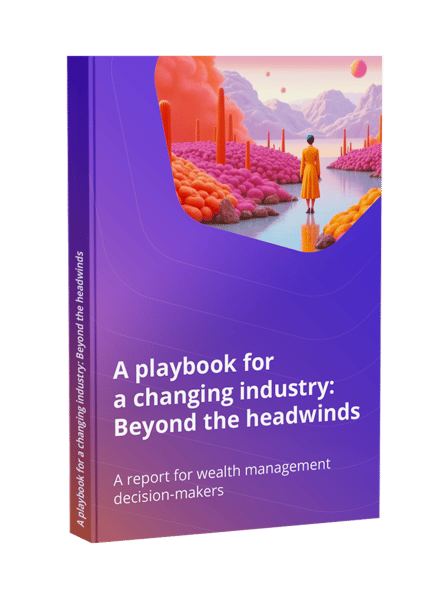Wealth management: The four inescapable headwinds reshaping the industry
The wealth management industry is at a critical junction, driven by shifting client expectations, fee compression, and the rise of next-gen wealth amid intensifying competition.
Despite a record-breaking surge in global assets under management (AUM) to £161 trillion in 2023, the largest annual increase since 2019, firms face mounting pressure to innovate or risk falling behind.
In this article, we explore the headwinds shaking up the wealth management industry.
1. Squeezed profits: rapidly changing expectations and cross-border wealth

The way wealth is transferred and how clients engage with their advisors are undergoing dramatic changes.
Traditional commission-based models are giving way to fee-based advisory services, driven primarily by younger generations who demand greater transparency and long-term strategies tailored to their needs.
Clients today seek more than asset allocation; they need guidance on residency, investment migration, and tax efficiency.
In fact, in 2023, average fees fell to 22 bps, down from 25 bps in 2015 and 26 bps in 2010.
This is compounded by rising costs, which have grown 80% since 2010, growing at a 5% CAGR, and continuing their upward trajectory today.
The ‘race to the bottom’ for fee-based revenues is real and taking hold.
But it’s not just fee structures that are shifting, wealth allocation is too.
Geopolitical shifts and macroeconomic uncertainty are fundamentally changing how wealth is allocated and where it is stored. For example, the UK’s rising economic instability, tightening regulation, and security concerns are driving HNWIs to seek alternative, more flexible wealth management options.
Countries like the UAE have emerged as attractive financial hubs, offering favorable tax policies and robust banking systems. One of the key advantages is the UAE’s corporate tax structure. In 2023, the country introduced a 9% corporate tax, applicable to businesses earning over AED 375,000 ($103,713) annually.
However, companies operating within Free Zones can still benefit from a 0% tax rate on qualifying income, provided they meet specific regulatory requirements.
Another major draw is the UAE’s foreign ownership policies. Historically, businesses on the mainland required a local partner to hold at least 51% ownership.
However, since 2021, the government has allowed 100% foreign ownership in many industries, particularly within Free Zones. This change has made it significantly easier for international businesses to establish themselves and operate independently in the region.
Families with assets spread across multiple jurisdictions must navigate complex tax structures and regulations that have become more challenging. Yet, many wealth management firms remain unprepared, relying on outdated models that fail to meet these evolving demands.
For instance, manual, paper-based processes are still used by some firms to manage client portfolios, handle tax reporting, and ensure compliance across various countries.
This outdated approach not only heightens the risk of errors but also makes it difficult to keep pace with the fast-changing international tax landscape. As a result, these firms struggle to meet the cross-border complexities that modern wealth management demands.
Firms must adapt, moving beyond mere product sales to become trusted partners who understand cross-border tax rules and the intricacies of global wealth management.
Firms that fail to adapt to the changing landscape of cross-border wealth will see their clients flock to more agile competitors.
2. The great wealth transfer: meet the next-gen of investors

A staggering $18.3 trillion USD will be transferred globally by 2030 - are you ready to meet the needs of the next generation?
Demanding digital-first experiences, ESG-driven investment strategies, and greater access to private markets, this next generation of investors stands in stark contrast with today’s investors.
Next-gen investors have a vastly different list of needs than their predecessors, and while this list below is not exhaustive - it highlights some of the key considerations when navigating the great wealth transfer expected to occur by 2030:
- Digital-First Wealth Management:
- Education and Advisory for Sophisticated Investing:
- Hyper-Personalization and AI-Driven Advisory:
One-size-fits-all doesn’t work anymore. Next-gen investors expect bespoke strategies that reflect their individual goals and risk appetite. Leveraging AI and data analytics to provide hyper-personalized recommendations ensures clients feel understood and valued.
- Values-Based and Impact Investing:
ESG investing is no longer a niche—it’s a must. Next-gen investors are focused on purpose-driven investments. Whether through sustainable options, philanthropy, or Sharia-compliant strategies, wealth managers must integrate these values to attract and retain clients.
- Transparency and Trust:
Transparency is key to building lasting relationships. Next-gen investors want clear, honest communication on fees, performance, and the impact of their investments. Firms must offer detailed, accessible reporting to ensure clients feel confident and informed.
- Flexible and Diverse Investment Opportunities:
Today’s investors are looking for variety—private equity, cryptocurrency, social impact bonds, you name it. Wealth managers must diversify their offerings and give clients the flexibility to invest in what aligns with their values and financial goals.

GET EARLY ACCESS TO
OUR NEW REPORT:
Analyzing the disruptive headwinds and growth opportunities in
Wealth Management
Join the waitlist for our forthcoming report on an industry headed into a perfect storm. Packed with insights from C-Level executives, global thought leaders, and industry disruptors alongside market analysis and real-world case studies, our report will provide strategic solutions and actionable takeaways to successfully navigate massive industry transformation.
3. The private markets boom is just beginning: the rise of alternative investments

Alternative investments, including private equity, private credit, and infrastructure, now account for 15% of global assets.
As traditional portfolio allocations evolve, high-net-worth and ultra-high-net-worth investors increasingly seek exposure to alternatives, spanning private equity, private credit, real estate, and venture capital.
To embrace this shift, investors must adopt a proactive approach: diversifying across asset classes, prioritizing long-term value over short-term liquidity, and partnering with firms that offer deep expertise and curated access.
Firms successfully navigating this change are expanding their offerings beyond public markets, leveraging exclusive deal flow, co-investment opportunities, and digital platforms.
Yet, this evolution is not without its challenges–liquidity concerns, regulatory constraints, and the need for robust due diligence–remain key hurdles.
For those prepared to adapt, alternatives represent more than just a hedge against volatility; they are becoming a cornerstone of modern portfolio growth.
4. AI will be a game-changer: how to keep the human edge

AI and automation are transforming portfolio management, financial planning, and client interactions - and with the rise of next-gen investors, the demand for firms to adapt is pressing.
But there’s a catch.
Sixty-five percent of high-net-worth investors still want a human advisor to oversee major decisions. This means you won’t just win by integrating AI into your operations and going all-in on digital, you will need to strike a careful balance between automation and high-touch service.
There are a number of clear benefits to integrating AI into your business, Such as:
- Risk profiling and asset allocation are net beneficiaries of the AI revolution.
- AI facilitates the development of client micro-segmentation by incorporating dynamic and attitudinal behaviors to create more precise risk profiles.
- AI serves a clear benefit when it comes to reporting and client communications, by enabling personalized touchpoints and real-time alerts on market and life events, analyzing client preferences and optimizing engagement channels.
AI, blockchain and automated advisory tools are reshaping service delivery already, and as a result, clients now expect seamless digital experiences, personalized insights and real-time access to their portfolios.
Rather than developing in-house solutions, wealth management firms should look into partnering with FinTech innovators.
These partnerships can help wealth management firms speed up digital transformation journeys, and offer their clients the best of both worlds - AI-driven insights and automated tools, alongside the personalized service they expect.
While emerging technologies promise greater efficiency, they also raise concerns about the loss of personal touch.
High-net-worth individuals continue to prioritize bespoke strategies, making it essential to thoughtfully integrate automation without compromising the human expertise they rely on.
The key is not just adopting technology, but strategically deploying it to enhance, rather than erode, the personalized experience clients expect.
The challenge for firms will be finding that equilibrium.
Wealth management is changing, will you be ready?
The future of wealth management will be defined by firms’ ability to innovate and adapt to rapidly changing demands. The shift from traditional product-based advice to a more holistic, client-centric approach is vital.
By embracing digital transformation and offering tailored global solutions, firms will not only stay relevant but also thrive in an increasingly competitive market.
As wealth mobility becomes more significant, firms must focus on providing clients with advice not only on investments but also on the full spectrum of global financial planning - from residency rights to cross-border tax strategies.
Those who can offer these integrated services will strengthen their client relationships and set themselves apart from competitors still relying on outdated models.
The wealth management industry is shifting, and firms that are prepared to embrace change will lead the way. Like a chess game where strategies keep evolving, those who adapt instead of repeating the same moves will thrive. In other words, anticipate and adapt or risk being left behind.
References:
BCG Global Asset Management Benchmarking Database - 2024
You may also like
These related articles

The 8 great myths of corporate innovation

Finding growth from your core: when to pursue market penetration strategies
